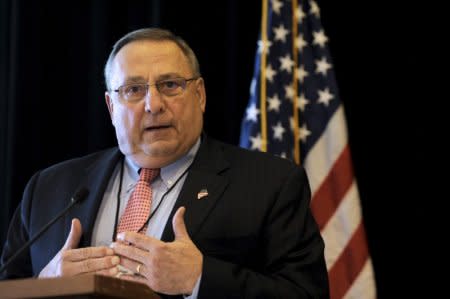Maine governor's outburst tests limits of anger politics

Thomson Reuters
By Scott Malone
BOSTON (Reuters) - Years before Donald Trump dominated the news cycle with his angry style of politics, Maine Governor Paul LePage made headlines with a similarly brash approach.
Since he was elected in 2010, the Republican has told critics of his decision to skip a civil rights breakfast to "kiss my butt" and accused a Democratic rival of forcing budget measures on taxpayers "without Vaseline."
But when the second U.S. governor to endorse Trump recently left an obscenity-laced voicemail message for a lawmaker who he believed had called him a racist, he put his career in jeopardy.
LePage's widely circulated verbal attack, in which he called Democratic State Representative Drew Gattine a "little son-of-a-bitch, socialist cocksucker," sparked the most intense firestorm of criticism the second-term governor has seen. Even legislative leaders from his own party called him into a closed-door meeting to discuss his future.
The reaction shows that not all politicians can get away with the kind of bellicose approach that helped Trump wipe out his primary rivals and win the support of angry voters who feel U.S. politicians do not care about their problems.
"Trump is a master of media and LePage is not. They are very different at the end of the day," said Michael Franz, chairman of the government and legal studies department at Maine's Bowdoin College. "Trump says he hates the media, but he works it very well. LePage just hates it."
The governor infamously joked in 2013 that he would like to blow up the offices of the Portland Press Herald newspaper, which he felt treated him unfairly.
LePage early on Tuesday openly discussed the idea of stepping down in a regular monthly interview with a Maine radio station. He later backed away from that notion, paraphrasing Mark Twain in a Twitter post that read in part, "The reports of my political demise are greatly exaggerated."
Still his own party was not rallying around him.
"I have yet to see any Republican legislator come out on the record in his defense," said Mark Brewer, a professor of political science at the University of Maine, after LePage's voicemail incident.
TRUMP BEFORE TRUMP
LePage endorsed Trump's run in February, shortly after New Jersey Governor Chris Christie.
"I was Donald Trump before Donald Trump became popular," LePage said at the time, saying that the New York real estate mogul and reality TV star "could be one of the greatest presidents if he sits down and puts together a good team."
Trump has also praised LePage, saying that he would offer him a role in his administration "if he were available."
Both men describe their political styles as authentic and off-the-cuff and accuse more measured rivals of being career politicians who are out of touch with the needs of average voters.
LePage's brusqueness had played well in Maine until recently. He won re-election in a three-way 2014 race with the support of 48 percent of voters with a wider margin of victory than the 38 percent he commanded in his first run, also a three-way race.
Neil Levesque, executive director of the New Hampshire Institute of Politics said that success, coupled with Trump's rise, could have emboldened LePage to double down on attack politics.
"Almost anything goes now. You can call your opponents almost anything, you can threaten them," Levesque said. "This is the new norm in American politics."
(Reporting by Scott Malone; Editing by Andrew Hay)
See Also:

 Yahoo News
Yahoo News 
